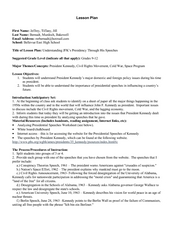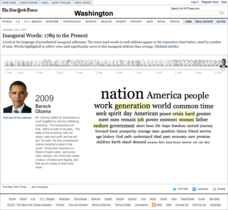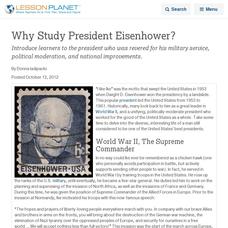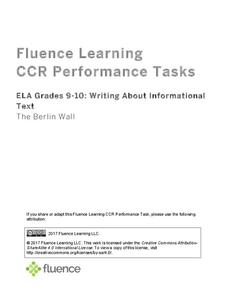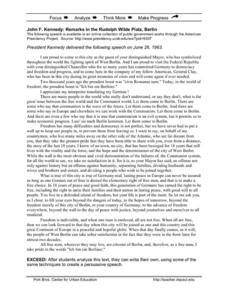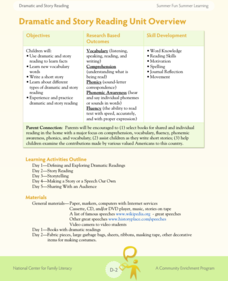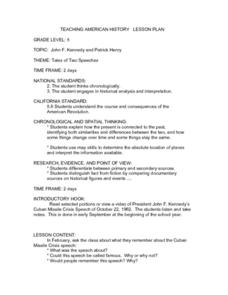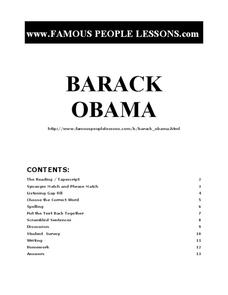Curated OER
Understanding JFK's Presidency through his Speeches
Students reflect and discuss the major events that happened in the United States in the 1950's and 1960's. In this U.S. History lesson, students read and analyze the famous speeches during this time frame, then complete a worksheet that...
University of California
The Civil War: Lincoln’s Speeches
Abraham Lincoln is responsible for uniting the states during the most tumultuous periods in American history, and for his elegant oratory that kept the Union believing in its cause. Young histoians analyze various speeches by America's...
Curated OER
The Civil War: A Nation Divided
Discuss the differences between the North and the South and how those differences led to the Civil War. Middle schoolers examine and analyze a famous speech or writing by President Lincoln in order to better understand the speaker's...
Curated OER
Freedom by the Fireside: The Legacy of FDR's "Four Freedoms" Speech
Students read and analyze Franklin Delano Roosevelt's 1941 State of the Union Address. They listen to recordings of speeches by F.D.R., answer discussion questions, and participate in a debate.
Curated OER
Famous People - A Quiz on Definite and Indefinite Articles
This online, interactive worksheet helps English language learners practice identifying the correct article among four options. Feedback is immediate by clicking on the answer button following each questions. It includes 15 questions...
Franklin D. Roosevelt Presidential Library & Museum
Pearl Harbor Activity #2: Why Do Words Matter?
Words matter! That's the big idea behind an activity that asks scholars to replace words in FDR's "Day of Infamy" speech with synonyms. They then listen to a recording of President Roosevelt's address and compare his version to their own.
Curated OER
Remembrance of Things Past
Engage critical and social thinking by exploring the value of language and word choice. The class considers the article "The Silence of the Historic Present" and analyzes several presidential speeches. They engage in class discussion,...
The New York Times
Inaugural Words: 1789 to the Present
One of the reasons presidential inaugural speeches are so inspiring is the way word choice reflects the historical context of the time. An interactive timeline invites learners to click on their president of choice and view the most...
Curated OER
Why Study President Eisenhower?
Introduce learners to the president who was revered for his military service, political moderation, and national improvements.
Curated OER
George Washington: The President Without Precedent
Students explore time period and events surrounding George Washington's inauguration, demonstrate how Washington set precedent for each action he took as American Republic's new president, and compare and contrast traditions and events...
Fluence Learning
Writing About Informational Text The Berlin Wall
On June 26, 1963 President John F. Kennedy delivered his famous "Ich bin ein Berliner" speech close to the Berlin Wall at the Rudolph Wilde Platz. On June 12, 1987 President Ronald Reagan Delivered his famous "Mr. Gorbachev, tear down...
Polk Bros Foundation
John F. Kennedy: Remarks in the Rudolph Wilde Platz, Berlin
“Ich bin ein Berliner.” Here’s the full text of John F. Kennedy’s famous address delivered to the people of Berlin on June 26, 1963. The resource could be used as part of a study of Kennedy’s presidency, of rhetorical devices, or as...
National Endowment for the Humanities
“Read All About It”: Primary Source Reading in “Chronicling America”
Can investigative journalism become too sensationalistic and accusatory, or is it vital for the survival of a democracy? Middle schoolers analyze primary source documents from early 20th-century newspapers as well as Theodore Roosevelt's...
DocsTeach
The Path of Justice: Selma and the Voting Rights Act
The civil rights movement: An ongoing battle for change. The activity focuses on President Johnson's speech in response to the massacre at the Selma March. Academics study the speech, complete a hands-on-activity, and discuss President...
John F. Kennedy Presidential Library & Museum
Ask Not What Your Country Can Do for You
Ask not what the lesson here can do for you, but what you can do with the lesson. The answer is quite a lot! Young scholars revisit JFK's famous inaugural address with a focus on his plea for civic engagement. There's a letter to JFK...
Humanities Texas
Primary Source Worksheet: Lyndon B. Johnson, Excerpt from “The Great Society”
Young historians examine Lyndon Johnson's vision for a rich, powerful, and upward society as detailed in this excerpt from his famous "Great Society" speech presented at the University of Michigan in 1964.
Polk Bros Foundation
Abraham Lincoln: The Gettysburg Address
Thursday, November 19, 1863. The dedication of the Soldier’s National Cemetery in Gettysburg, PA. The Gettysburg Address. The full text of Lincoln’s famous speech is here for your class members to examine, to research, or to replicate....
National Center for Families Learning
The Summer Fun Summer Learning Dramatic and Story Reading Unit
What's the difference between story reading and story telling? Participants in a summer enrichment program learn all about the difference as they listen to famous speeches, engage in dramatic readings, and craft their own short stories...
Curated OER
A Day of Infamy:Analyzing FDR’s Pearl Harbor Address
In 1941 FDR spoke out on the events at Pearl Harbor. The class will get to analyze word choice, word meaning, author's craft and structure by analyzing an actual draft of this speech. They will look critically at the words used,...
Curated OER
Tale of Two Speeches
Students view and read portions of John F. Kennedy's Cuban Missile Crisis speech from October 22, 1962. Later in the year, students recall what they remember about the speech and use a Venn Diagram to compare it to Patrick Henry's...
Anti-Defamation League
Shirley Chisholm: Unbought, Unbossed and Unforgotten
A 13-page packet introduces high schoolers to a lady of amazing firsts. Shirley Chisholm was the first Black woman elected to Congress, the first Black woman to run for President of the United States, and a leader of the Women's Rights...
Curated OER
African Pride- Reading Comprehension
In this reading comprehension worksheet, students read a speech which the President of South Africa delivered. Students answer questions, and write an essay.
Curated OER
The Gettysburg Address: An American Treasure
Learners apply information found in Lincoln's speeches, especially The Gettysburg Address, to create a persuasive speech on a current topic.
Curated OER
Barack Obama
For this famous person worksheet, students read a passage about Barack Obama and then complete a variety of in-class and homework activities to support comprehension, including partner interviews, spelling, cloze, synonym matches, and...


